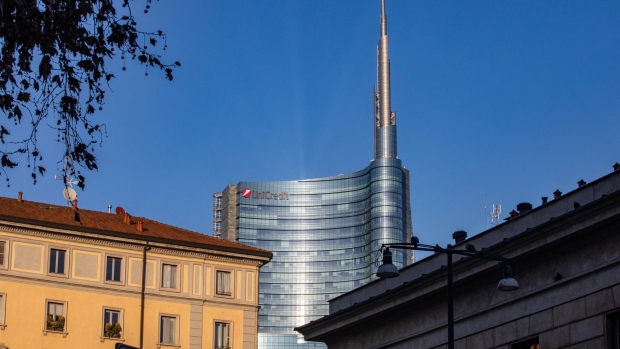Oct 26, 2022
UniCredit Boosts Targets a Second Straight Quarter on Rates
, Bloomberg News

(Bloomberg) -- UniCredit SpA raised full-year revenue and profit targets for a second straight quarter, joining European peers in posting better-than-expected results on rising interest rates.
The Milan-based lender now sees 2022 profit excluding Russia above €4.8 billion ($4.74 billion), up from an earlier forecast of about €4 billion. Key performance metrics for the three months through September -- including net income and revenue -- were all better than expected.
Since becoming chief executive officer last year, Andrea Orcel has exited businesses and cut jobs in non-core locations, shifting to more lucrative products and capital-light activities to streamline the lender. Those efficiency efforts are now being buoyed by sharp official interest-rate increases at the European Central Bank, brightening the revenue outlook for the region’s lenders after years under the negative-rate regime.
UBS Group AG and Scandinavia’s Nordea Bank Abp are among other European lenders also benefiting from rising net interest income as central banks tighten monetary conditions to fight inflation. Higher rates are a benefit to banks as it allows them to reap more from the loans they have on their books.
Third-quarter net income at UniCredit was €1.71 billion, compared with the €1.08 billion estimated by analysts. Higher revenue, lower loan-loss provisions and the Russia subsidiary boosted results. Revenue of €4.83 billion compared with estimates of €4.52 billion.
“Good commercial dynamics, a favorable interest rate environment, cost discipline and low cost of risk” allowed UniCredit to further improve its 2022 guidance, Orcel said in a statement on Wednesday. “I am confident that UniCredit is well positioned to manage through whatever economic environment we face.”
The results bolster UniCredit’s intentions to continue with one of the most generous shareholder payouts in Europe, worth at least €16 billion through 2024. The bank plans to give investors returns on 2022 earnings in line with or better than 2021. In the case of severe recession it would be “able to honour the majority of its 2022-2024 distribution ambition.” It also confirmed 2024 targets, including on capital and profitability.
“UniCredit benefits from higher NPL coverage and more conservative macro assumptions than peers,” Jefferies analysts Benjie Creelan-Sandford and Marco Nicolai wrote in a note to investors. “We see upside to net interest income and believe UniCredit can deliver about €14.5b out of the planned capital return.”
UniCredit shares gained about 2.2% in Milan trading as of 9:42 am local time.
Russia Boost
Orcel has hedged his bets on Russia by holding off on the same kind of full-scale exit as rival Societe Generale SA, continuing to earn revenues while reducing the size of the business. UniCredit said it’s cut its total Russian cross-boarder exposure by 50% to €3.1 billion, though the local subsidiary is still delivering higher profit and generating capital buffers.
UniCredit is disengaging from the country in an “orderly and decisive” fashion and continuing to refocus operations mostly on its international clients, Orcel said in a Bloomberg TV interview.
The unit’s profit rose to €344 million on higher revenues and a release of provisioning due to the shrinking loan portfolio. Since the beginning of war, UniCredit decided to refer to its targets excluding Russia.
UniCredit, Austria’s Raiffeisen Bank International AG and SocGen were the top Western European lenders in the nation on the eve of the Ukraine invasion. UniCredit took almost €2 billion of charges on its unit in the first quarter in attempt to head-off a complete loss of the business there. In the meantime, the exit of rivals and actions to limit the effect of sanctions is aiding its activities on the ground.
Revenue Generation
Revenue rose 9% from a year earlier on higher income from lending and a 84% increase in trading, driven by strong corporate demand for hedging products. That more than offset the one-off repricing of the TLTRO -- the ECB’s ultra-cheap loans granted at the height of the pandemic to keep credit flowing and stave off deflation. UniCredit posted about €300 million of one time charges on its TLTRO funds after euribor rates rose.
Cleaning up the bank remains a key objective for Orcel. The firm booked €84 million in additional provisioning in the quarter, while its non-performing loan ratio stood at 2.9% in the period.
UniCredit’s common equity tier 1 ratio, a key measure of financial strength, fell to about 15.4% from about 15.7% at the end of June. The bank is targeting a CET1 above 14% at the end of the year, from 13% previously.
(Adds analyst comment in eighth paragraph, shares in ninth)
©2022 Bloomberg L.P.






